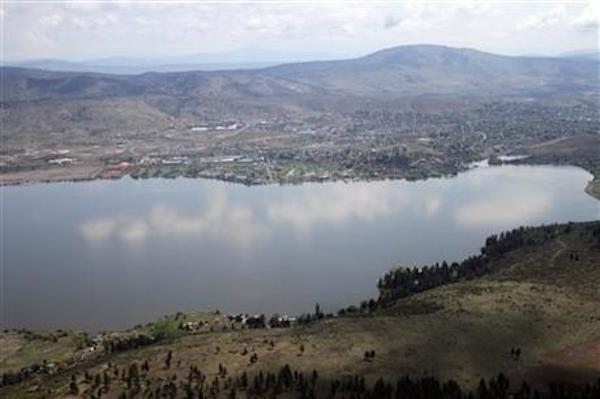Historic Truce in Century-Long Water War Balances Needs of Klamath Tribes, Farmers

The century-long water war between the Klamath Tribes and the farmers and ranchers upstream could be drawing to an end, as negotiations were completed on March 5 for a deal to allocate water in drought-stricken southern Oregon and northern California.
Last year the Klamath were forced to use their newly decreed water rights, which the state had ruled date back to “time immemorial,” to cut off irrigation to upper Klamath Basin cattle ranches in order to save tribal hatcheries. Since then the worsening drought in California, which has prompted both an emergency declaration and state legislation, has been lending urgency to the situation.
RELATED: Descending Drought Puts Klamath Tribes and Farmers on Brink of Water War
The hallmarks of the agreement are a water use program to increase stream flows and add 30,000 acre feet each year to the Upper Klamath Lake in a plan that maintains stability for agricultural operations in the Upper Klamath Basin, the tribe said in a media release. The second major part is a riparian program to restore and maintain riverbank habitats, thereby sustaining fisheries. The agreement also includes an economic development fund for the Klamath Tribes, and four public sites where tribal members can harvest fish as allowed under treaty.
The Klamath Tribal Council voted on March 5 to support the Proposed Upper Klamath Basin Comprehensive Agreement, which would become part of legislation already before the state senate that includes the removal of four dams on the Klamath River, recovery of the Mazama Forest, 90,000 acres of lands that used to be part of the Klamath Tribes Reservation, limited water use in the Lower Basin, plan for water management during severe droughts, and “significant funding” for habitat restoration and monitoring programs in tribal fisheries, the tribe said.
RELATED: Landmark Klamath River Restoration and Dam Removal Agreements Signed
Klamath Tribes to Buy 90,000-Acre Mazama Forest
“I am very pleased with the Klamath Tribal Council’s support of the Proposed Agreement,” said Don Gentry, Chairman of Klamath Tribes, in a statement. “If approved, we will see an increase in water flows, improved habitat for current and future fish populations, and economic opportunities for our Tribe and Tribal members. It will help us restore our homeland and honor the Treaty our ancestors signed 150 years ago.”
"This agreement is nothing short of historic," said Oregon Governor John Kitzhaber in a statement. "On one of the more complex issues facing the state, people committed their time, energy and expertise to come up with solutions that support a stable agricultural economy and healthy fisheries and riparian areas."
The reverberations were felt nationally as well, with Department of the Interior Secretary Sally Jewell weighing in with approbation.
"I congratulate the Upper Klamath Basin community and the Klamath Tribes for their work to settle one of the most complex and difficult water disputes in the West,” Jewell said in the governor’s statement. “The settlement unifies the Upper Klamath Basin by providing for a sustainable irrigation economy and protecting jobs while also restoring the streams of the native homeland of the Klamath Tribes in a manner that recognizes their senior water rights. I look forward to working with partners of the basin to enact legislation that makes this agreement and related agreements in the lower basin a reality."
The parties involved have 30 days to sign off on the agreement. The Klamath Tribes will hold four community meetings before holding a vote.
Read more at http://indiancountrytodaymedianetwork.com/2014/03/06/historic-truce-century-long-water-war-balances-needs-klamath-tribes-farmers-153876